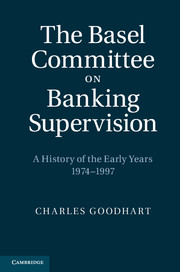Book contents
- Frontmatter
- Contents
- Figures
- Tables
- Foreword
- Preface
- 1 Introduction
- 2 The antecedents of the BCBS
- 3 Modus operandi
- 4 The Concordat
- 5 External and foreign exchange issues
- 6 Capital adequacy and the Basel Accord of 1988
- 7 The Market Risk Amendment
- 8 The Core Principles of Banking Supervision
- 9 Liquidity
- 10 Off-balance-sheet exposures and derivatives
- 11 Other topics addressed by the BCBS
- 12 The relationship of the BCBS with banks and other banking regulators
- 13 Relationships with other non-bank oversight and supervisory bodies
- 14 The legal position of the BCBS
- 15 The international relations of the BCBS
- 16 The BCBS and the social sciences
- 17 Epilogue
- Bibliography
- Index
- References
15 - The international relations of the BCBS
Published online by Cambridge University Press: 07 September 2011
- Frontmatter
- Contents
- Figures
- Tables
- Foreword
- Preface
- 1 Introduction
- 2 The antecedents of the BCBS
- 3 Modus operandi
- 4 The Concordat
- 5 External and foreign exchange issues
- 6 Capital adequacy and the Basel Accord of 1988
- 7 The Market Risk Amendment
- 8 The Core Principles of Banking Supervision
- 9 Liquidity
- 10 Off-balance-sheet exposures and derivatives
- 11 Other topics addressed by the BCBS
- 12 The relationship of the BCBS with banks and other banking regulators
- 13 Relationships with other non-bank oversight and supervisory bodies
- 14 The legal position of the BCBS
- 15 The international relations of the BCBS
- 16 The BCBS and the social sciences
- 17 Epilogue
- Bibliography
- Index
- References
Summary
The salient events
I have chosen five key occasions as those that changed the relationships between the BCBS and the rest of the world. These are in chronological order:
The abandonment of the mandate to introduce an international early warning system (EWS) (see Chapters 2 and 5) and its replacement by a self-generated programme of harmonising cross-border supervision of international banking (Chapter 4).
The political pressure to introduce common capital adequacy requirements on international banks, to approach a ‘level playing field’ (see Chapter 6).
The realisation, when preparing the Market Risk Amendment, that the large international banks had become technically more sophisticated with respect to risk management than the BCBS (see Chapter 7).
The growing perception of a need for some political oversight of the international regulatory process, initially because of breakdowns in the negotiation of common positions between IOSCO and the BCBS (see Chapter 13).
The political request to the BCBS to set ‘Core Principles of Banking Supervision’ (see Chapter 8), which changed the BCBS’ self-perception from its narrow role (as recommending proposals to G10 governors) towards a wider role as standard-setter for banks worldwide.
Let us take each of these, in turn, starting with the BCBS’ reinterpretation of its mandate. As described in Chapters 2 and 5, the Governors had originally established the BCBS, in the aftermath of the Herstatt failure and at a time of raised concern about the effects of the Euromarkets, to construct an early warning system for future international crises. Each member country of the G10 (except Luxembourg) was to have two members, and initially the second participant was to be an expert in foreign currency and exchange rate matters from the central bank. But the BCBS, under the chairmanship of George Blunden, quite rapidly came to the conclusion that the Committee could add little, or nothing, to the analyses and predictions of international crises done at national level. The Governors put up no fight against this rejection of their initial pet scheme, and allowed the BCBS a wide measure of freedom to set its own agenda.
- Type
- Chapter
- Information
- The Basel Committee on Banking SupervisionA History of the Early Years 1974–1997, pp. 560 - 571Publisher: Cambridge University PressPrint publication year: 2011
References
- 8
- Cited by



